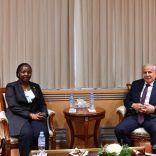Kenmare Resources urges decision on Mozambique rights renewal
Poor resource deals continue as Sasol accused of transfer pricing – Hanlon

Mozambique’s ability to negotiate and enforce contracts with foreign companies continues to be very weak. The latest report is that Mozambique is gaining much less than expected from the Pande-Temane gas. Not only did Mozambique agree a poor contract, but CIP (Centro de Integridade Publica, Public Integrity Centre) last week accused The South Africa partner, Sasol, of transfer pricing and inflated costs. http://bit.ly/CIP-Sasol or https://www.cipmoz.org/images/Documentos/Industria_Extrativa/SASOL_will_continue_to_milk_Mozambique.pdf
The World Bank and its private sector arm IFC predicted Mozambique would earn $500 mn in the first decade of the project to export gas by pipeline from Inhambane to South Africa. Actual earnings were only $142 mn in the decade 2004-2015. In part this was because the initial contract limited the amount Sasol pays for gas, which turned out to be one-quarter of world market prices. The contract was renegotiated after the first decade, but earnings are still under $80 mn per year.
CIP notes that Sasol owns 70% of the Mozambican gas production company, and accuses it of charging too little to its South African parent, and inflating capital and operating costs. CIP also says that in the period 2011-14, the amount of gas produced as reported to the tax authorities was only two-thirds the amount given in other reports.
In an earlier, August 2017, report CIP accused Sasol of dubious conduct in its plan for production of light oil and gas from an adjoining field in Inhassoro and Temane. Sasol admits the project will be unprofitable and the government will earn little, yet it wants to go ahead. Why? CIP says that the Pande-Temane contract ends in 2029 and the gas field reverts to Mozambique, but the Inhassoro-Temane field is linked, so if the unprofitable field is producing Sasol would keep control of the adjoining and profitable Pande-Temane field. https://www.cipmoz.org/images/Documentos/Industria_Extrativa/Exploration_of_natural_Gas.pdf
CIP also calls for the regulator, the National Petroleum Institute (INP, Instituto Nacional de Petroleos), to be made more independent by making it responsible to parliament instead in the Mining and Energy Ministry. An independent body with supervisory powers would have picked up the transfer pricing and other violations, CIP says. https://www.cipmoz.org/images/Documentos/Industria_Extrativa/INP_LONGE_DE_SER_AUTORIDADE_REGULADORA.pdf
Fertiliser: Government continues to fail to make the best use of natural resource contracts for Mozambique’s own development. Yara, the giant Norwegian fertiliser producer, earlier this year won the contract to produce fertiliser from gas. One of the biggest constraints to Mozambican agriculture is that farmers use very little fertiliser, because it is so expensive. Yara was prepared, if asked, to include distribution in Mozambique of reduced price fertiliser from gas. This would have been a boon for family farmers. But Mozambique’s only goal in the gas tenders was to maximize income, so there is no cheap fertiliser for local farmers. Indeed, a year ago, Yara closed its fertiliser blending plant in Beira. (Zitamar, 23 Feb 2017)
By Joseph Hanlon













Leave a Reply
Be the First to Comment!
You must be logged in to post a comment.
You must be logged in to post a comment.